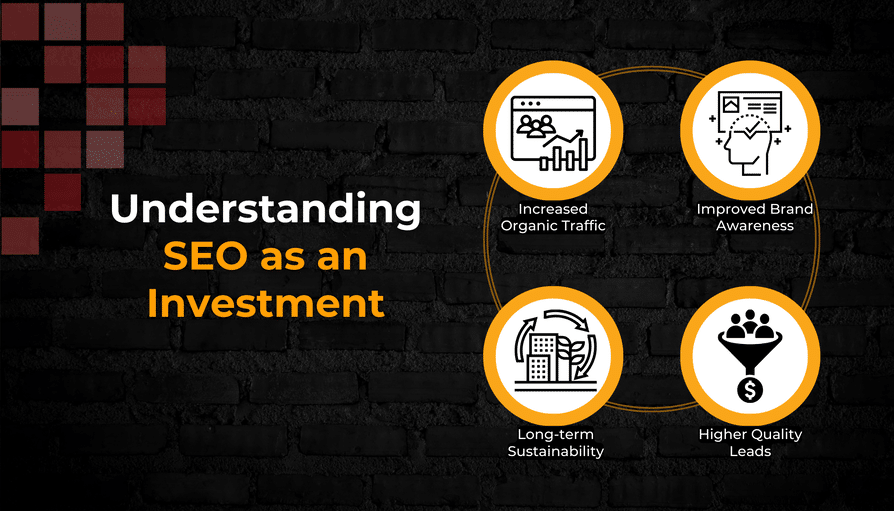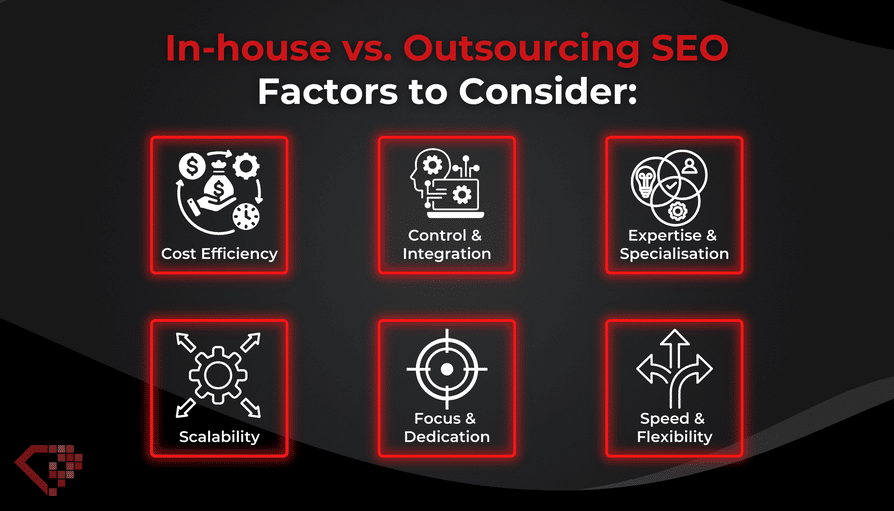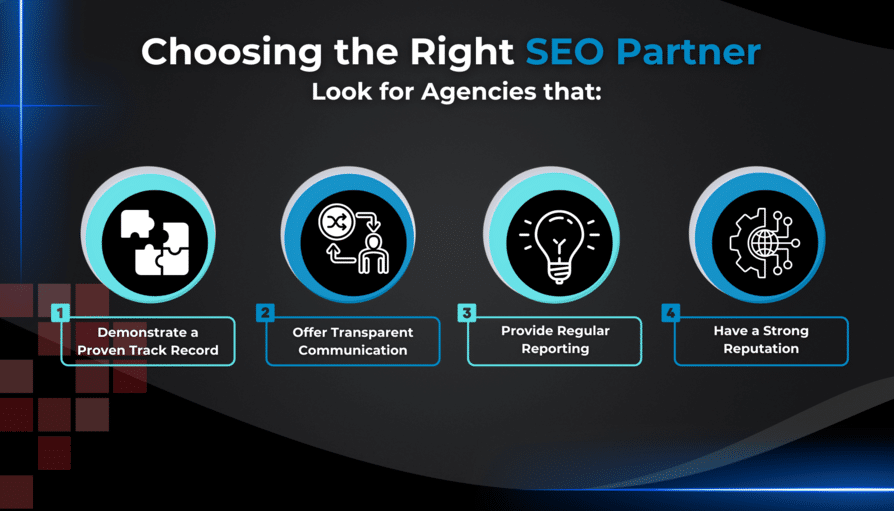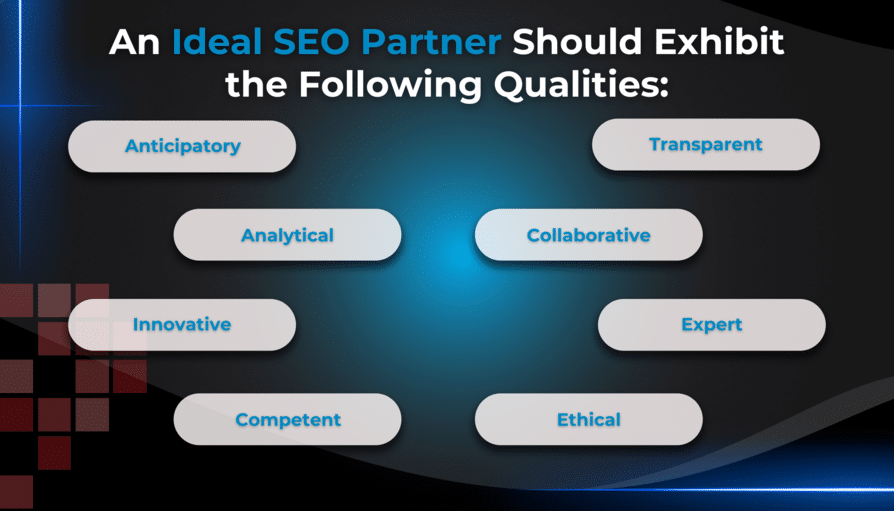Search Engine Optimisation (SEO) is not just a marketing tactic. It is a strategic investment in your business’s online presence and long-term growth. Just like investing in stocks or real estate, SEO requires a commitment to building value over time. The rewards, however, are substantial – increased website traffic, higher brand visibility, and ultimately, a boost in revenue.
But what exactly does it mean to view SEO as an investment? Does investing in SEO add value? And how can businesses overcome the common hurdles that often prevent them from fully embracing SEO’s potential?
In a recent webinar, Ruby Digital and BizHack Academy explored these questions in depth, sharing insights on how to shift your mindset from seeing SEO as a cost, to recognising it for what it is: a powerful tool for building digital equity. If you missed the webinar, you can catch the full recording here.
In this post, we will distil the key takeaways from the webinar, providing you with a clear understanding of why SEO should be a core component of your business strategy. We will discuss the benefits of investing in SEO, how to overcome psychological barriers to SEO adoption, and the role of SEO in different industries. We will also provide practical tips on how to start your SEO journey, even on a budget.
Understanding SEO as an Investment
Investment Mindset
Think of SEO like investing in a financial product. You would not expect immediate, skyrocketing returns. Instead, you would focus on steady, long-term growth.
SEO is similar. It requires patience, consistent effort, and a focus on building value over time. And just like compound interest, the benefits of investing in SEO accumulate over time, leading to:
- Increased organic traffic: As your website climbs the search engine rankings, you will attract more visitors who are genuinely interested in your products or services.
- Improved brand awareness: Higher visibility in search results establishes your brand as an authority in your industry, building trust and credibility with potential customers.
- Higher quality leads: SEO attracts users who are actively searching for solutions you offer, increasing the likelihood of conversions and sales.
- Long-term sustainability: Unlike paid advertising, where traffic stops when you stop paying, organic search traffic from SEO continues to flow even after you have stopped actively investing.

SEO in Your Financial Portfolio
Just as a diversified financial portfolio mitigates risk, it is wise to diversify your lead generation channels. Relying solely on one channel, such as paid advertising, leaves you vulnerable to fluctuations in costs and algorithm changes. SEO provides a reliable, long-term source of organic traffic.
SEO also helps you overcome challenges like click inflation (rising costs of paid clicks) and poorly performing channels. By investing in SEO, you create a consistent stream of high-quality leads that are less susceptible to external factors.
In recent years, AI-powered content creation tools have emerged as valuable resources for SEO. While they can help streamline content production and optimise for search engines, it is important to remember that AI has limitations. Human creativity, expertise, and nuanced understanding of your audience are still essential for creating truly compelling content that drives conversions.
Overcoming the SEO Psychological Barrier
Present Bias
One of the biggest psychological hurdles to SEO investment is the concept of present bias. This cognitive bias leads us to favour immediate rewards over long-term gains. Remember that SEO is a marathon, not a sprint. Consistent effort over time is what leads to lasting success.
Here are some strategies to overcome present bias:
- Start small: Begin with achievable goals and gradually scale up your SEO efforts as you see results.
- Create habits: Incorporate SEO tasks into your daily or weekly routine. Small, repetitive actions can lead to significant improvements over time.
- Focus on progress, not perfection: Celebrate small wins along the way and use them as motivation to continue your SEO journey.
Gauge the Importance of SEO in Various Industries
The value of SEO varies across different industries. While it is beneficial for all businesses with an online presence, it is particularly important in industries with:
- High customer value: When the lifetime value of a customer is high, attracting even a small number of additional customers through SEO can significantly impact revenue.
- Long buying journeys: SEO plays a crucial role in industries where customers spend considerable time researching and comparing options before making a purchase decision.
- Competitive markets: In saturated markets, SEO can help your business stand out from the competition and capture a larger share of organic search traffic.
Impact on Company Valuation
Consistent, long-term investment in SEO can significantly increase a company’s valuation. For potential acquirers, a strong organic search presence is a valuable asset that signals a healthy, sustainable business model with a steady stream of high-quality leads.
SEO Readiness Assessment
To help businesses gauge their SEO preparedness, Ruby Digital offers a comprehensive SEO Readiness Assessment. This free online tool guides you through a series of questions designed to evaluate your company’s current capabilities and identify areas for improvement.
By completing our SEO Readiness Assessment, you will gain valuable insights into:
- Your current SEO maturity level: Understand where your business stands on the SEO spectrum.
- Key strengths and weaknesses: Identify areas where you excel and those that need attention.
- Actionable recommendations: Receive personalised advice on how to enhance your SEO strategy.
- Prioritisation of SEO efforts: Determine which initiatives will have the greatest impact on your business.
For businesses seeking expert guidance, a fractional CMO (or part-time marketing executive) can be invaluable in achieving SEO readiness. A fractional CMO provides strategic marketing leadership on a part-time or project basis, offering a cost-effective way to access high-level expertise.
Starting SEO on a Budget
Even if you are working with a limited budget, you can still kickstart your SEO efforts. Here are some initial budget recommendations:
- Small businesses: should reinvest between 5-10% of their annual revenue back into marketing per month.
- Scaling businesses: should reinvest between 10-20% of their annual revenue back into marketing per month.
Remember, it is better to start small and gradually increase your investment as you see results.
Economies of Scale for Companies
Larger companies often have an advantage when it comes to SEO due to economies of scale. They can leverage their existing resources, brand reputation, and website authority to achieve and maintain high rankings. However, smaller businesses can still compete by focusing on niche markets, long-tail keywords, and local SEO strategies.
Setting Realistic Goals
Set realistic goals based on your industry, competition, and target audience. Consider these questions:
- What are your primary SEO objectives (e.g., increased website traffic, higher rankings, more leads)?
- What is your target audience searching for online?
- How competitive is your industry, and what keywords are your competitors targeting?
- What resources (time, budget, expertise) do you have available to invest in SEO?
Market-Fluctuation Growth
Much like the stock market, SEO investment is subject to fluctuations. While the overall trajectory is often upward, there will be periods of both growth and stagnation. It is important to understand this cyclical nature and prepare for inconsistent results over time.
Just as seasoned investors do not panic during market downturns, businesses should not abandon their SEO strategies when they encounter temporary setbacks. Instead, use data-driven insights to adapt your approach.
- Track your progress: Regularly monitor your to identify trends and areas for improvement.
- Stay informed: Keep up with the latest SEO news and algorithm updates to anticipate changes and adjust your strategies accordingly.
- Be patient: SEO takes time to yield results. Do not expect overnight success, but rather focus on building a strong foundation for long-term growth.
- Partner with experts: If you are unsure how to navigate SEO fluctuations, seek guidance from a reputable SEO agency like Ruby Digital.
In-House vs. Outsourcing SEO
Key Factors to Consider
- Cost efficiency: In-house SEO can be more cost-effective initially, but it requires ongoing investment in staff, tools, and training. Outsourcing tends to be a more predictable expense.
- Control and integration: In-house teams have more control over their SEO strategy and can seamlessly integrate it with other marketing efforts. Outsourcing requires clear communication and collaboration with the agency.
- Expertise and specialisation: SEO agencies have dedicated teams with diverse skill sets and experience across various industries. In-house teams may lack the depth of knowledge and specialisation required for competitive SEO.
- Scalability: Outsourcing allows you to quickly scale up or down your SEO efforts based on your needs. In-house teams may require additional hiring and training to accommodate growth.
- Focus and dedication: SEO agencies are solely focused on delivering results for their clients. In-house teams may have competing priorities.
- Speed and flexibility: Agencies can often implement SEO strategies more quickly due to their experience and dedicated resources. In-house teams may face delays due to limited resources.

Using AI for SWOT Analysis
Artificial Intelligence (AI) can be a valuable tool for conducting a SWOT (Strengths, Weaknesses, Opportunities, Threats) analysis to inform your decision. AI-powered tools can analyse vast amounts of data to identify patterns and insights that might not be apparent through manual analysis.
Benefits of Outsourcing
A reputable SEO agency can provide:
- A comprehensive range of services: From technical SEO audits to content creation and link building, agencies offer a wide array of services to address all aspects of your SEO strategy.
- Specialised knowledge: Agencies stay up to date with the latest SEO trends and algorithm changes.
- Proven track record: Reputable agencies have a portfolio of successful client cases, demonstrating their ability to deliver results.
Choosing the Right SEO Partner
Look for agencies that:
- Demonstrate a proven track record: Review case studies and testimonials from past clients.
- Offer transparent communication: Ensure the agency is upfront about their strategies, processes, and expected outcomes.
- Provide regular reporting: Choose a partner who provides detailed reports on your SEO progress, highlighting both achievements and areas for improvement.
- Have a strong reputation: Check online reviews and industry recognition to assess their standing in the SEO community.

The ideal SEO partner should exhibit the following qualities:
- Anticipatory: Proactively identify and address potential challenges before they become problems.
- Analytical: Use data-driven insights to make informed decisions and optimise strategies.
- Innovative: Stay ahead of industry trends and adopt cutting-edge techniques to achieve optimal results.
- Competent: Possess a deep understanding of SEO principles and best practices.
- Transparent: Openly communicate their strategies, processes, and progress.
- Collaborative: Work closely with your team to align SEO efforts with your overall business goals.
- Expert: Have a team of skilled professionals with diverse expertise in various SEO disciplines.
- Ethical: Adhere to industry standards and avoid black-hat SEO tactics that could harm your website’s reputation.

In-House SEO Operational Necessities
If you choose to handle SEO in-house, start with a few basic steps that require minimal investment.
- Keyword research: Identify relevant keywords your target audience is using.
- On-page optimisation: Optimise your website’s content and structure for search engines.
- Content creation: Develop high-quality, informative content that aligns with your target keywords.
- Link building: Start building relationships with other websites in your industry to earn backlinks.
- Tracking and analysis: Monitor your website traffic and rankings to assess your progress.
Understanding Your Audience
Knowing your target audience‘s needs and interests is crucial for creating content that resonates with them. Conduct thorough research to identify their pain points, questions, and preferred search terms. This will help you create content that not only ranks well in search engines but also drives conversions.
Technical SEO Basics
Implementing technical SEO ensures that search engines can crawl and index your website effectively. While you may need the assistance of an SEO technical analyst for more complex issues, you can start by addressing basic elements like:
- Website speed: Optimise your website’s loading time.
- Mobile friendliness: Ensure your website adapts seamlessly to different screen sizes.
- XML sitemap: Create an XML sitemap to help search engines discover and index your pages.
- Robots.txt: Use a robots.txt file to guide search engine bots on how to crawl your website.
Building Quality Backlinks
Backlinks from reputable websites are a powerful signal to search engines that your website is trustworthy and authoritative. Focus on earning quality backlinks through guest blogging, or creating great resources (like tutorials, white papers or in-depth guides) other sites will want to link to. Avoid cheap or spammy link-building tactics, as these can harm your website’s reputation and even lead to penalties from search engines.
Monitoring Progress
SEO is an ongoing process that requires continuous implementation, testing, adjusting, and repeating. Regularly monitor your website’s performance using analytics tools to track your rankings, traffic, and conversions. Analyse this data to identify what is working and what needs improvement, and then adjust your strategies accordingly.
In Closing
By embracing a long-term perspective and understanding the cyclical nature of SEO, you can unlock its full potential and build lasting digital equity. For a more in-depth discussion on the topics covered in this blog post, we encourage you to watch the full webinar recording.
Whether you choose to embark on your SEO journey in-house or partner with a trusted agency like Ruby Digital, remember that SEO is a continuous process that requires dedication, expertise, and adaptability.
By investing in SEO, you are investing in your business’s future. You are creating a sustainable source of organic traffic, improving your brand visibility, and ultimately driving revenue growth.
Ready to take the first step towards a brighter digital future through SEO for your business? Take our free SEO Readiness Assessment today and discover how Ruby Digital can help you achieve your online goals.



